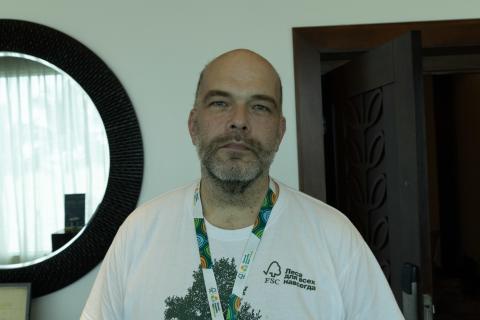Motion on motions: transparency wanted
One of this year’s most conspicuous motions is Motion 4, which asks FSC to follow up on motions in a more transparent and reliable way. The Brazilian NGO Imaflora asks FSC to engage in stakeholder dialogue and regular reporting on the actions taken to implement the motions.
FSC General Assembly 2001
One of this year’s most conspicuous motions is Motion 4, which asks FSC to follow up on motions in a more transparent and reliable way. The Brazilian NGO Imaflora asks FSC to engage in stakeholder dialogue and regular reporting on the actions taken to implement the motions.
“We proposed this motion because we as well as others have experienced a lack of dialogue with FSC regarding the follow-up on motions by FSC. For those who fought and discussed to have a motion passed, it is very frustrating if the motion is not implemented fully or follows an interpretation that is different from the intent of the proponents”, says Mauricio de Almeida Voivodic, Director of the Brazilian NGO Imaflora.
According to Mr. Voivodic, FSC runs the risk of devaluing the event from its lack of openness and follow-through on motions: “This tends to reduce the importance of the event”, he says. “For stakeholders to continue being engaged in FSC, they need to have faith in the General Assembly and trust
that the motions will be implemented”.
Alienating stakeholders
Jakob Ryding of Forests of the World describes how the NGOs’ frustration reached an all-time high during the process of trying to engage with FSC’s main control organ, Accreditation Services Interinational (ASI) on the implementation of Motion 50, passed in 2008. The motion asked ASI to ensure that certification bodies focus adequately on field performance during their auditing.
“Throughout the following years, we had the impression the motion was being ignored by FSC and ASI. During annual dialogue meetings held between FSC, ASI and the NGOs, we were appalled to find that ASI appeared to be quite unaware of the motion, despite the fact that it was specifically asking ASI to take action”.
“ASI has not once contacted any of those who were involved in developing and proposing motion 50 in order to discuss the contents of the motion, the intentions behind it or to receive clarifications. This sort of approach tends to alienate us as stakeholders, although we are deeply engaged in the system and would like to provide constructive contributions to improve it”.
Data access: a major transparency issue
Jakob Ryding’s quest to understand how ASI is implementing Motion 50 from 2008 incidentally led to his discovery of a major transparency issue: “We found the information on the ASI database to be somewhat at odds with the figures reported in ASI’s own annual activity reports. Also, less than half of the audit reports that ASI is expected to publish are online”.
Motion 30 (2011) states:
“True transparency comes from making everything public except the few things that are strictly confidential, not from hiding everything except the few things that direly need to be made public”.
Greenpeace’s motion is being negotiated as this article is written.
Forests of the World, Greenpeace and others also question why only forest management related auditing reports are required to be made public; there is no similar obligation pertaining to audit reports covering Controlled Wood or Chain of Custody audits; thus public scrutiny of these areas of FSC’s and ASI’s performance is made impossible.
Greenpeace has proposed a motion (no. 30) this year, requesting all auditing reports by certification bodies and ASI be made publicly available in their full length, except for confidential contents.



